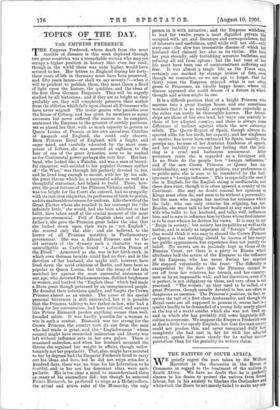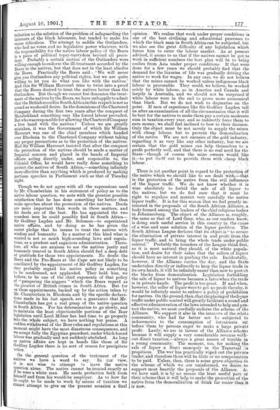THE NATIVES OF SOUTH AFRICA. .
ythSeir1i
Wouisellut. of
AVE Jia greatluydregettthee pacruts.stiaokneninb Commons in regard to the treatment of the natives , in South Africa. We have no doubt that he is perfectly sincere in his desire to protect- the natives from forced labour, but in his anriety to blacken the Outlanders and whitewash the Boers he not merely failed to make any con' cause ridiculous. The attempt to ,saddle the Outlanders, who had no votes and no legislativepower, whatever, with the responsibility for the native labour policy of the Boers is a piece of political topsy-turvydom beyond, all prece-. dent: Probably a certain section of the Outlanders were willing enough to endorse the ill-treatment accorded by the Beersto the natives, but that does not in the least absolve the Boers. Practically the Boers said : We will never give you Outlanders any political rights, but we are quite willing to let you do what you like with the natives.' And this Sir William Harcourt tries to .twist into a proof that the Boers desired to treat the natives better than the Outlanders. But though we cannot but denounce the treat- ment of the natives by the Boers,we have unhappilyto admit that the British re.cordin South Africa in this respect is.not as sound as we should desire. In the dominions of the Chartered Company during the first two years after the conquest of Matabeleland something very like forced labour prevailed. But who was responsible for allowing the Chartered Company a free hand with the natives ? Unless we are: greatly mistaken, it ,was the Government. of which Sir William Harcourt was one of the. chief members which handed over Rhodesia 'to the Chartered Company without taking any proper precautions as to the protection of the natives. Had Sir William Harcourt insisted that'after the doinfinest the protection of the- natives -should be:Made a matter' of Imperial . concern and placed in .the hands of Iraperial Officers acting , directly.. tinder, and responsible to, 'the Colonial Office; he would have 'really- done soraething:to preteCt;thenatiYes. of South 'Africa,soinething infinitely moreeffectiVe than anything-which is 13rodtheed.13Yinakitig partisan Speechei in Parliament 'such as that of Tuesday night.
Though we do not agree with all . the expressions. -used by Mr.- Chamberlain in his statement of policy as to-the native labour 'question, we note with the greatest possible satisfaction that he• has.: done something far .better than make speeches :about the protection of the natives. Deeds are more important than : words in --these matters, and his deeds are of the- best. - He . has appointed the two soundest- men he could possibly find in South Africa— Sir Godfrey Lag,den and :Mr. -Solomon—to superintend native affairs, and. -by doing so he - has given the surest pledge that - he means to treat- the natives with wisdom-and humanity. -In a matter of -this kind what is wanted is not so "inn& high-sounding laws and - regula- tions; as npradent and- sagacious administration. - - There- fore, all who are- anxious to see the natives justly and humanely treated in South' Africa should feel 'a deep debt of. gratitude for those - two appointments: No doubt :the Boers and the Pro-Boers at the -Cape are 'not likely to be conciliated by the appointment of Sir Godfrey Lagden, for they probably- regard' his ....native policy "as something to be condemned, -- not 'applauded. They --held- him, we believe; to -be' one' of the chief exponents of that policy of -"pampering the -niggers which' the Boers regard as the greatest of British crimes in South Africa,. 'But for us these appointments, backed' up by the action-- taken by Mr. Chamberlain in Rhodesia and by the specific declara- tions -made -in. his last speech, are a guarantee -that Mr. Chathherlan has, got a real grasp .of the native question in South Africa. For his- determination-to go-slowly, and to, maintain the least objectionable portions of the Boer legislation until Lord Milner has had time to go properly into the -.Whole subject, we -have nothing but praise. -A suddenwithdrawal of the Boexrules and regulations at this moment might have the most disastrous -consequences, and we accept fully the Egyptian-precedent, under which forced labour was gradually:and not- suddenly abolished. - As long as native. affairs • are kept - in hands . like those of Sir Godfrey Lagden there is no sort, of reason for precipitate action. .
. On the general question of the-- treatment of the natives we have . a word sag. • - our view, it is .• not - wise to attempt . to leave the . native question, alike. The native cannot betreated exactly' as if he were a white: man. He 'needs pretectien both' from himself' and from his wouldAse'emplciyer: ite to 'how fax 116 'ought to lie- made to work by means of Aziation we cannot 'attempt to 'give' On' the 'present occasion' a' final . . tribetion to the Solution of the problem of safeguarding the opinion. We realise that work under proper conditions-is • ierests of the black labeurers, but tended to make his one of the best civilising. .and educational processes to which the black man-in South Africa can be su jected, but we also see the great difficulty Of.: any legislation which forces him to enter the labour .market. As at present advised, it seems to us that if the natives cannot be got to work in sufficient- numbers the best plan -will: be to ;bring coolies -from Asia. under proper conditions.- • If that were done. fer 'a few years we should probably find that the demand for the luxuries of life was gradually driving the native to:work for wages.- In any case, we do not believe that the mines cannot be worked unless indigenous black labour is procurable. They could; we believe; be. worked solely by .white labour, as in America and Canada and largely in Australia, and . we :should. nit be surprised- if white labour were in the - end to • prove more economical than black. But we do not wish- to dogmatise on the point. :If men of experience like Sir Godfrey Lagden- tell us after an examination of all the circumstances that it will be best for the. natives to make them pay a certain moderate sum in-taxation every year, and so indirectly force them to earn money, we shall feel inclined to bow to their decision. Only the object must be -not merely to supply the mines with . cheap labour, but to prevent. 'the demoralisation of the native. We are not enemies of the gold industry, regarding . it as' very like any other industry, but-we -are certain that the gold mines can help, themselves • to • a profit -perfectly well, and that there is no real need- for the State--thongh of- . course the mine ,owners' weuld.:lilm itto put • itself: out :to provide :them with :cheap black labour.
, There is yet ainother, point in regard to the protection of the native which we, should like to - see dealt .with,-7-that is the protection -of the native from. the , evil, influences of the -liquor traffic. We do not know whether -it is wise, absolUtely to forbid the sale of all •liquor to the natives, • but we do feel sure that it must be right to regulate and restrict very carefully • the native liquor traffic. • It is for this reason that we feel greatly in-- terested in the proposals of the South African Alliance, a body formed among the leaders of the chief religious bodies in Johannesburg. The object •of the Alliance is,-roughly, the same as that of Lord Grey, who, as our readers . know, is doing such • useful service in this country in the cause of ,a wise and sane solution of the. liquor problem. The South African League declares that its object is " to secure the elimination of private • interest in and profit from the liquor traffic„ and to. bring the whole trade underpublie control." Probably the founders of the League think first, as it is most natural they should, of the white popula- tion, and desire for their. sakes that the sellers of liquor shotild have no interest in pushing the sale. - Incidentally, however,. if the .Allianee carries the day, and the State undertakes directly or indirectly to keep the liquor. trade in its own hands, it will be infinitely easier than now to protect the' blacks from _demoralisation. Legislation forbidding the sale 'of liquor to-natives becomes fireeWhen the trade is in private hands. 'The-profit is too -great., andwhen, however; 'the Seller Of liqUer Wereto get no profit thereby, it would be -infinitely easier to enforce a policy of prohibition for natives. On the ground, then, thattheplacingof thelisiter trate tinder public control will greatly facilitate a sound and effectiver.adniinistintion of the laWs intended to help and pro- tect the native; we most -cerdially'endaise the scheme of the Alliance. We support it also in the interests of the .hits community, who had' far 'better not be subjected to indeoements to the consumption of - intoxicants :s"0 bef-ore" them by perSona eager to make a" inz:ge privatg profit. • La;§tly, tveare in favour of the Alliance schema because it- will supply a very considerable revenue with- out direct taiation,alwitys: a great source of trouble. in a young detnninuity.- The moment, too, for making the sale of ,liquor --a State monopoly in the Transvaal" propitious. The war has practiCally wiped out the private trader; and therefere there will-be little or no compensation to he. pnid. Unless, then, there is some grave Objection.& the scheme ,of Which we- are 'iini*iformed, we desire to support most 'heartily the 'proposals of, -the : wellaye 'Salk itieby >ro means the least useful -part:; Of their-Scheele that-it. will hap ta make the protectien ;of the native-froin the dentoraliiition of 'drink fax easier' than-it is no*. • '



































 Previous page
Previous page